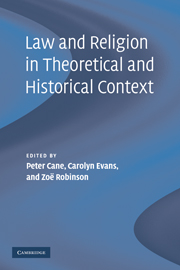Book contents
- Frontmatter
- Contents
- List of Contributors
- 1 Introduction
- 2 The moral economy of religious freedom
- 3 Understanding the religion in freedom of religion
- 4 Why religion belongs in the private sphere, not the public square
- 5 Pluralism in law and religion
- 6 The influence of cultural conflict on the jurisprudence of the religion clauses of the First Amendment
- 7 From Dayton to Dover: the legacy of the Scopes Trial
- 8 A very English affair: establishment and human rights in an organic constitution
- 9 Days of rest in multicultural societies: private, public, separate?
- 10 Australian legal procedures and the protection of secret Aboriginal spiritual beliefs: a fundamental conflict
- 11 Secular and religious conscientious exemptions: between tolerance and equality
- 12 Law's sacred and secular subjects
- 13 Freedom of religion and the European Convention on Human Rights: approaches, trends and tensions
- Index
2 - The moral economy of religious freedom
Published online by Cambridge University Press: 07 July 2009
- Frontmatter
- Contents
- List of Contributors
- 1 Introduction
- 2 The moral economy of religious freedom
- 3 Understanding the religion in freedom of religion
- 4 Why religion belongs in the private sphere, not the public square
- 5 Pluralism in law and religion
- 6 The influence of cultural conflict on the jurisprudence of the religion clauses of the First Amendment
- 7 From Dayton to Dover: the legacy of the Scopes Trial
- 8 A very English affair: establishment and human rights in an organic constitution
- 9 Days of rest in multicultural societies: private, public, separate?
- 10 Australian legal procedures and the protection of secret Aboriginal spiritual beliefs: a fundamental conflict
- 11 Secular and religious conscientious exemptions: between tolerance and equality
- 12 Law's sacred and secular subjects
- 13 Freedom of religion and the European Convention on Human Rights: approaches, trends and tensions
- Index
Summary
By asking after the moral economy of religious freedom, I mean to ask: What do we have to believe about religion, religious faith and religious practice to support an attractive and robust view of religious freedom? Do we, for example, have to believe that religious commitments and activities are more valuable to individuals or groups than other deeply motivated projects? Or, if not more valuable, more important in some phenomenological or conceptual sense? Do we have to believe in the truth or falsity of some set of premises that are at the bottom of all, most, or at least some religions? Do we have to assign special status to religion on grounds of its particular value or importance to the state? Do we, in sum, have to find some grounds of this sort to justify a privileged status for religion and its entailments, from which status we can in turn derive a reasonably warm-blooded view of religious freedom?
The stakes here are high. If religious freedom depends on a view that religion is in the sense suggested by these questions a privileged activity among the many activities that sometimes matter greatly to some people, then religious freedom is at best deeply controversial by its nature. Worse, as we will see, if religious freedom depends on religious privilege, then the idea of religious freedom is self-contradictory at its core.
- Type
- Chapter
- Information
- Law and Religion in Theoretical and Historical Context , pp. 16 - 25Publisher: Cambridge University PressPrint publication year: 2008
- 3
- Cited by



